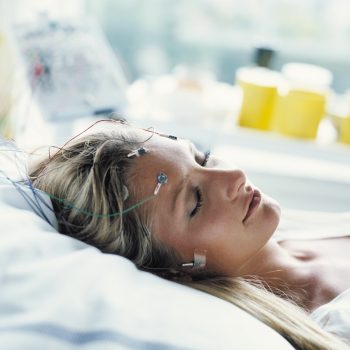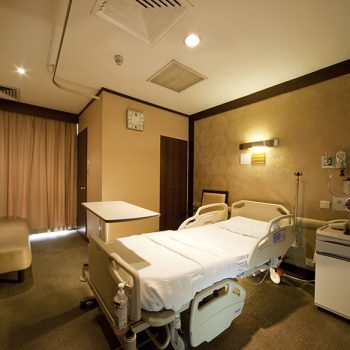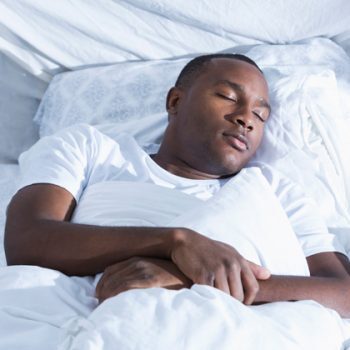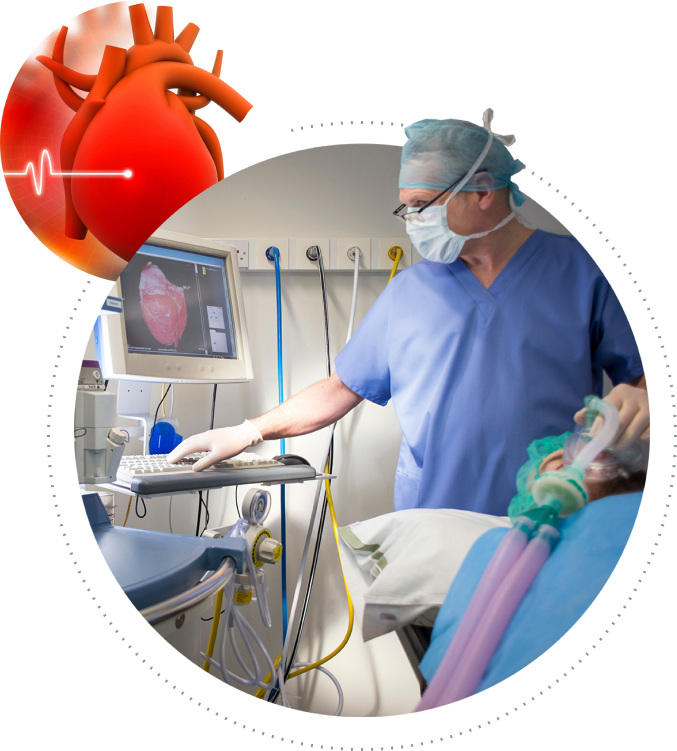Quality sleep is vital for your overall health and is often the first thing that gets overlooked. Our Sleep Lab offers in-lab studies that monitor your breathing, heart rate, brain waves, and more while you sleep to uncover issues that may be impacting your rest and long-term wellness.
Sleep Lab
.png?width=722&height=537&name=patient-resources%20(2).png)
Your Overnight Sleep Study: How We Care for You
An in-lab sleep study, or polysomnogram, is an overnight test that measures your brain activity, breathing, heart rate, oxygen levels, and movements while you sleep. This gives your doctor a complete picture of your sleep patterns so they can make an accurate diagnosis and create a treatment plan tailored to you.
At our Sleep Lab, you can expect:
- Quiet, comfortable rooms designed to help you rest naturally
- Expert evaluation from board-certified sleep medicine physicians
- Personalized care plans, including CPAP therapy when needed
- Guidance and education to help you understand and improve your sleep health
When Is a Sleep Study Recommended?
Your provider may suggest a sleep study to:
- Test for sleep-related breathing disorders such as sleep apnea
- Diagnose conditions like narcolepsy or hypersomnia
- Evaluate unusual behaviors during sleep (parasomnias)
- Adjust CPAP therapy for patients with sleep apnea
- Determine why current treatment for a sleep disorder isn’t working
A home sleep apnea test may be an alternative for some patients, but an in-lab study provides the most comprehensive evaluation.
Signs You May Need a Sleep Study
Poor sleep can affect your heart, brain, and overall health. You may benefit from a sleep study if you experience:
- Loud snoring or pauses in breathing during sleep
- Daytime sleepiness or morning headaches
- Mood changes, depression, or anxiety
- Trouble concentrating or memory loss
- Frequent nighttime urination
- Reduced libido or sexual dysfunction
Sleep Apnea and Your Health
Undiagnosed or untreated sleep apnea can increase the risk of:
- Stroke
- High blood pressure
- Heart arrhythmias (like atrial fibrillation)
- Type 2 diabetes
- Heart failure
- Obesity-related complications
- Increased medical costs and even sudden cardiac events
Early diagnosis and treatment can significantly improve your quality of life and lower these risks.
Your Sleep
To begin, we'll find out if you're getting good-quality sleep.

Get a Great Night's Sleep

Quiet Comfortable Room

You Sleep - We Study
Obstructive Sleep Apnea
Stroke
- Patients with moderate to severe OSA are 3x more likely to have a stroke
- The risk of stroke rises with the severity of the disease.
- OSA is often found in patients following a stroke.
Chronic Pain
- Up to 80% of patients with fibromyalgia have Sleep Apnea
- 75% of patients treated with moderate to high doses of opioids have Sleep Apnea
Poor Sleep
- Many patients may not be aware of their poor sleep quality.
Mood Disturbance
- Depressin
- Anxiety
- loss of motivation
- Shortened attention span
- Moodiness and bad temper
- Low testosterone
Gastroesophageal Reflux Disease
- Possible treatment options are:
- Weight loss
- Heartburn Medications
- CPAP Therapy (continuous positive airway pressure)
Loud Snoring
- Relationship Discord
- Morning headaches
Daytime Sleepiness
- 7x more likely to have a car accident
- Impaired concentration and memory loss
- Reduced work efficiency
- Reduced alertness
- Slower reaction time
Sexual Dysfunction
- Loss of libido
- Impotence
Diabetes type II
- The treatment of Sleep Apnea may have as much of an effect as prescribed oral medications
Obesity
- As sleep shortens or diminishes in quality, appetite for high-calorie food increases
- Approximately 80% of OSA patients are overweight
Nocturia
- Frequent urination at night
Stress on the Heart
Congestive Heart Failure
- Newly diagnosed patients should be screened for OSA
Cancer
- Severe forms of Sleep Apnea have a 65% greater risk of developing cancer
Drug Resistant Hypertension
- Sleep Apnea is an identifiable cause of high blood pressure
Cardiac Arrhythmias
- 4x as likely to have atrial fibrillation
Medical Costs
- Untreated Sleep Apnea costs Americans an extra $4.3 billion per year
- Treating Sleep Apnea can cut a patient’s healthcare costs in half.
Sudden Death
- OSA sufferers have a 30% higher risk of heart attack or premature death
- More than 50% of sudden deaths from ISA occur between 10PM and 6AM
New Patient Information
As a new patient, your first visit will lay the foundation for our ongoing relationship and ensure you receive the best care possible. Here's what you need to know.
Simple Stress Test
Have you been scheduled for a simple stress test? Learn everything you need to know to prepare, including what to wear and which medications to stop taking.
Nuclear Stress Test - Cardiolite
Our nuclear stress test with cardiolite requires some preparation in advance. Discover what you need to do before coming in for the procedure, including when to stop caffeine, certain medications, and more.
Nuclear Stress Test - Lexiscan
With the Lexican nuclear stress test, patients will need to do a few simple things before coming in for the procedure. Read on to learn what you need to do to prepare for a Lexican nuclear stress test.

Frequently Asked Questions
What is heart failure?
Heart failure occurs when the heart doesn't pump blood as well as it should.
What can I do to stay heart-healthy and reduce my risk of heart issues?
The most important things you can do to prevent further heart issues and live a long, healthy life are:
- Follow a heart-healthy diet low in saturated fat, trans fat, sodium, and added sugars. Eat plenty of fruits, vegetables, whole grains, lean proteins and healthy fats.
- Aim for at least 30 minutes of moderate physical activity daily or as tolerated. Walking, swimming, and other aerobic exercise promotes heart health.
- Take all prescribed medications to manage blood pressure, cholesterol, diabetes, and other conditions.
- If you smoke, commit to quitting.
- Limit alcohol intake.
- Manage stress levels through yoga, meditation, counseling, or other outlets.
- Get enough quality sleep each night.
- Keep all follow-up care appointments to monitor your health.
What causes high blood pressure and how can I reduce it?
High blood pressure, also known as hypertension, generally develops over time. Common causes include an unhealthy diet, inactivity, obesity, genetics, diabetes, and kidney disease. Getting your blood pressure checked regularly is essential in diagnosis, as high blood pressure typically has no signs or symptoms until it reaches a point where it becomes a hypertensive crisis.
Lifestyle changes and medications can help lower your blood pressure. Our doctors will work with you to develop a plan to keep you healthy and feeling well.
What causes heart arrhythmias and are they dangerous?
Heart arrhythmias occur when the electrical impulses that coordinate your heartbeat become disrupted. There are different types, with some causes including:
- Heart disease, high blood pressure, or prior heart attack that has damaged the heart’s electrical system
- Congenital heart abnormalities present from birth
- Imbalances in electrolytes like sodium, potassium, or magnesium
- Effects of caffeine, alcohol, medications, or stimulants
- Physical causes like sleep apnea or thyroid disorders
- Stress or strenuous exercise
Sometimes, there is no identifiable cause for an arrhythmia. Whether an arrhythmia is dangerous depends on the type, frequency, and one’s overall heart health. Some may cause bothersome symptoms but are otherwise benign. However, certain arrhythmias can significantly raise the risk of stroke, heart failure, or sudden cardiac arrest. The good news is very effective treatments are available for most arrhythmias.
What are the symptoms of a heart attack?
A heart attack is a serious medical condition. If you suspect you may be having a heart attack, call 911. Common symptoms of a heart attack:
- Chest pain or discomfort, often described as tightness, pressure, squeezing
- Pain that radiates to the neck, jaw, shoulders, arms, or back
- Shortness of breath, nausea, dizziness, sweating
- Abdominal pain
- Palpitations or irregular heartbeat
- Fatigue for days leading up to an event
What tests will I need to diagnose my heart condition?
Common diagnostic tests include an EKG, echocardiogram, stress test, CT scan, or cardiac catheterization. The CHS team will recommend the appropriate tests based on your symptoms and medical history.

.png)
